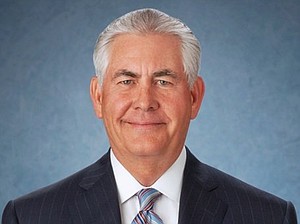3/14/2018

Analysis by Jamie Tarabay, CNN
(CNN) -- Rex Tillerson may have spent the last 14 months being contradicted by his boss on all manner of foreign policy, but the now-fired Secretary of State was at least a known quantity for US allies during tense moments in 2017.
His summary dismissal, by Presidential tweet on Tuesday, caught foreign ministries around the world by surprise and left diplomats scrambling to craft a response.
In Asia, where governments are engaged in hurried preparations for a momentous inter-Korea summit followed by a potentially historic encounter between President Donald Trump and Kim Jong Un, there were signs of nervousness.
Japan's Foreign Minister Taro Kono said he felt "much regret" over Tillerson's firing, saying he "was a counterpart who I truly trusted and could talk to candidly." Kono had been "looking forward to working on the North Korea issue" with him.
South Korean representatives had been expecting to meet Tillerson in Washington later this week, and Seoul insisted that business would continue as usual. "Both South Korea and the US shared the view that maintaining strong cooperation is ... necessary despite the personnel reshuffle in the US, as there are important pending issues between the two countries," the South Korean Foreign Ministry said in a statement.
Moscow, however, could not resist a dig. When asked whether he was concerned Tillerson's firing would further sour relations between Russia and the US, Kremlin spokesperson Dmitry Peskov, said: "It's hardly possible to get worse."
Analysts said that, despite often being undermined by his boss, Tillerson served as a useful buffer to Trump's impetuousness. With Defense Secretary James Mattis, he created "speed bumps" to any military escalation between Pyongyang and Washington, said John Park, Director of the Korea Working Group at Harvard Kennedy School.
"The partnership between Mattis and Tillerson was absolutely critical last year," Park told CNN. "Now the question is how will Secretary Mattis continue in terms of providing that function of a speed bump."
Trump said current CIA director Mike Pompeo would take over from Tillerson, who retired as chief executive of Exxon Mobil before agreeing to join Trump's administration last year.
Mattis may not enjoy the same kind of partnership with Pompeo as he had with Tillerson, particularly given Pompeo's stance on North Korea and its weapons program. In July last year, Pompeo told the Aspen Security Forum that the US administration needed to find a way to separate North Korean leader Kim Jong Un from his nuclear stockpile.
"As for the regime, I am hopeful we will find a way to separate that regime from this system," Pompeo said. "The North Korean people I'm sure are lovely people and would love to see him go."
Trump is the only one who matters
Pompeo's hardline position aside, all that matters is that Trump follow through on attending a meeting with Kim Jong Un, said James Person at the US-Korea Institute at Johns Hopkins SAIS. Trump surprised the world by accepting an invitation from the reclusive leader to see each other by the end of May.
"The fact that the president is now agreeing to the summit, hopefully that will be the party line for the time being," he told CNN.
South Korea would certainly hope as much.
"I think there's a greater sense of urgency moving forward with Trump and Kim Jong Un," said Park. "What comes after is a big question mark, but having Trump walk into that meeting and proceeding according to that agreement is a huge benefit to South Korea at this stage."
But that benefit is fleeting, Park pointed out. There is still no game plan for how the dialogue might continue, or who would serve as interlocutors for the administration. Last month the top American diplomat on North Korea, Joseph Yun, announced that he was retiring early. There is an acting ambassador in South Korea and hundreds of staff working on the Pyonyang issue, but the White House's diplomatic ranks are depleted.
Unpredictable White House
There's still no official word from Pyongyang on whether the meeting is going ahead, no details on when or where it would occur, and who would attend.
But a disruptive Oval Office, while unsettling to American allies like Japan and South Korea, is actually working to bring North Korea to the table, argues Person.
"I would say that's the reason they're even seemingly open to talks with the US," he said. "I think they pretty much believed they had US presidents and their administrations figured out. They saw us not responding militarily to the [seizure of US Navy Ship] Pueblo, the shootdown of the EC-121, they were openly laughing at us."
Trump's unpredictability and his quest to build an administration more in line with his own thinking might have actually earned him Pyongyang's respect, notes Daniel Russel, a former Assistant Secretary of State for East Asian and Pacific Affairs.
"North Korea sees in Trump a dominant leader whose subordinates are guided by him, not vice versa. That's a political system they can relate to, and explains why they were uninterested in dealing with Tillerson instead of Trump himself," said Russel, now a senior fellow at the Asia Society Policy Institute.
As the May summit approaches, expect more changes to come, Park warns.
"When you see Trump making statements. He now has the confidence to trust his instincts and judgment. We're going to see a very quick turnover and have the type of Cabinet Trump wants, individuals who amplify his thinking, not try and change it," said Park from the Harvard Kennedy School. "Things are going to move a lot faster now."
